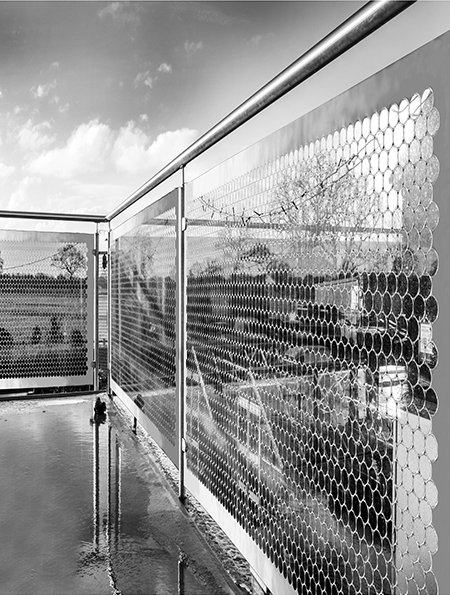A Discussion On Perforated Infill Panels vs Glass
In the architectural environment, perforated metal infill panels are growing increasingly popular

Designed as a flexible alternative to glass, perforated metal is ideal for railings, balustrades, mezzanines, walkways, and countless other parts of a building. This unique material offers strength and durability both indoors and outdoors while enhancing the aesthetic appearance of shopping centres, offices, manufacturing plants, and many other settings.
For years, the Croft Filters team has been custom-punching perforated metal plates to use within bespoke solutions for your customers. Our state-of-the-art machinery combined with 30 years of experience and skill means that we can develop designs specifically suited to your individual needs. Whether you're looking for stunning steel, aluminium, copper or brass, we have the power to create the panels that add a crucial finishing touch to your building.
So, what makes perforated infill panels such a valuable choice for today's architect?
The Benefits of Perforated Metal
Perforated metal has long been a common component of various industries. In filtering, perforated plate is available in a range of shapes and sizes for heavy-duty machinery. However, architects are quickly beginning to learn just how valuable this component can be for their designs too.
Perforated metal infill brings a unique combination of structural integrity and stunning appearance to an environment. Compared to glass, wire and mesh, perforated metal can be highly versatile, particularly when created by Croft - an expert in the creation of custom panels. We can manufacture your panels in a variety of finishes with powder coating, galvanisation, plates and RAL colours.
Some of the most common benefits of perforated infill panels include:
1. Improved Building Aesthetics
While glass has its place in the architectural world, it's a somewhat common and over-used material in many designs. However, perforated panels can provide a more unique and eye-catching aesthetic in any building.
There are virtually endless options when it comes to geometric patterns, sizes, hole shapes, and finishes, particularly when you work with a company like Croft Filters, who specialise in areas like additive manufacturing and bespoke design. What's more, unlike glass, perforated metal can allow occupants to enjoy exterior views outside of a building, while maintaining a degree of privacy.
2. Versatility and Durability
Perforated panels are available in a wide variety of styles and materials, depending on your needs. Croft Filters can easily bend and configure your infill panels to suit your design. This means that you can access the same material for structural components in your building, and decorative elements too. The structural benefits of the metal give designers and architects a wide range of options to explore.
Many architects have used perforated metal to create sunscreens that filter and manage light, or as railing infills that reduce the mass of the structure, while adding security and safety. Additionally, perforated panels have a structural strength that most other materials don't have. These materials can withstand even the harshest weather and feature a fantastic strength-to-weight ratio. What's more, because they're so lightweight, there's less pressure on the building's framework.
3. Energy Efficient and Eco-Friendly
Perforated infill panels are ideal for allowing a comfortable level of natural light into your structures through the day. They can deflect heat, balance light and improve ventilation, making it easier to reduce the impact on your building's energy requirements. Thanks to heat deflection, there's less energy output required from HVAC systems and perforated panels can also reduce the amount of artificial indoor lighting required.
Additionally, depending on the materials that you choose for your perforated panels, these solutions can also minimise resource depletion thanks to their ability to be recycled. For those who care about the environment, perforated panels are great for promoting sustainability.
Bringing Perforated Panels into Design
As versatile and flexible solutions for building design, structure and aesthetics, perforated infill panels are an excellent tool in the architect's kit. With the right partner in perforation, there's no limit to what you can accomplish with creative and innovative design options, which makes this material an exciting alternative to glass.
Used correctly, your panel systems will bring a unique appearance to your building, while still ensuring that you meet with the highest safety, privacy and security standards for your industry. What's more, because Croft Filters excels in offering bespoke design, you can rest assured that you'll be able to create panels to suit you, altering things like:
• Perforation opening size
• Opening shape (decorative patterns, circles, slots and more)
• Metal type and thickness
• Metal shape and bend
• Margin size
Ready to learn more? Contact Croft Filters today!
CONTACT
Neil Burns
Croft Filters Limited
sales@filters.co.uk
www.filters.co.uk
+44 1925 766265
Wednesday 2 October 2019 / file under Architectural | Construction



